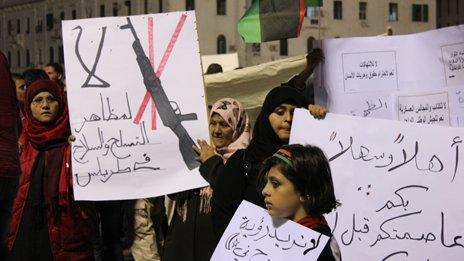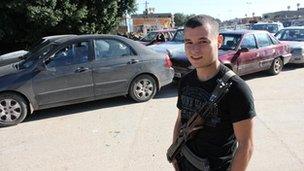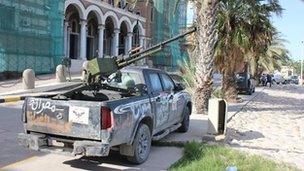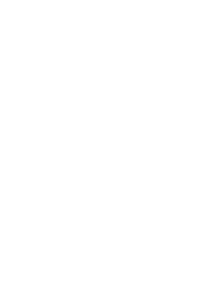Libya's rebels without a cause
- Published

Many feel if security is not guaranteed, rebuilding Libya will be impossible
In Libya's capital Tripoli, the ragtag bands of rebel fighters who liberated the city from Muammar Gaddafi's rule just four months ago are beginning to test people's patience.
"Your guns are scaring my children," read a sign at a recent demonstration in Martyrs' Square which was attended by thousands of disgruntled Tripoli residents, who want former fighters to turn in their weapons and go back to their home towns.
"They are Libyans so they are welcome here in Tripoli, but not with weapons," said Aref Salil, a smartly-dressed man in his 40s holding aloft a sign that read "Hands Off Tripoli".
"Their work here is finished. They should either go home, join the army, or lay down their guns."
Deadline
Since the fighting ended in October, rebel militias from Benghazi in the east to the Berber mountains in the west have made Tripoli their temporary home, bringing their Kalashnikov rifles and heavy truck-mounted guns with them.

Ahmad al-Hesh says he made some really good friends during the conflict
Benghazi fighters have taken over rooms in the Grand Hotel on Tripoli's seafront, while many fighters from the brigades around Zintan occupy holiday homes left empty by Gaddafi loyalists.
The local authorities have responded by issuing a two-week deadline for militias to leave the city and take their weapons with them.
Security, they say, will be handed over to the recently revived military police.
But on the streets, young men in mismatched army fatigues still stroll about carrying their guns and many are reluctant to leave behind the life of a rebel fighter that was as exhilarating as it was terrifying.
"We like carrying our guns. With them we can do what we want and go wherever we want," says Ahmad al-Hesh, a short, serious-looking, 24-year-old former student from the Misrata, the city that saw some of the bloodiest battles.
As he browses the stalls of revolutionary memorabilia in Martyrs' Square, his Kalashnikov remains slung over his shoulder, his casual t-shirt at odds with his camouflage trousers and army boots.
"There were some really bad times, but I liked the war," he says. "I made some really good friends and we went through so much together."
Valued
Fighters are also reluctant to give back their weapons until the government's revived national army and police force are seen as strong enough to take control.
The fear among many former rebels is that Gaddafi loyalists still linger in Libya, and are simply waiting for the right time to re-emerge.
"Most of the fighters are doctors, teachers, students like us," says Mr Hesh. "They just want to go back to their lives, but we can't give back our guns while in many areas it is still not safe."
Abdurrahim al-Keib, Libya's new interim prime minister, says he understands the concerns of the militias.

Many former rebels fear that Gaddafi loyalists still linger in Libya and may re-emerge
"They are worried that some one will try to steal the revolution from them," he says, sitting in the plush offices of the old Gaddafi regime.
Former rebels must eventually disarm or fall under the umbrella of the police or the national army he says, but forcing them to give up their guns or setting a timetable for disarmament will not work.
"We have to show these freedom fighters the gratitude and the respect they deserve."
"We want to give them opportunities, both in the national army and police force, and outside it. We want to make them feel as valued in the new Libya as they do with guns in their hands."
Time to readjust
Some former fighters have already chosen to return to civilian life, but many are finding that transition hard.
In Misrata, the university has reopened, bringing students back to a campus still riddled with machine gun fire and the gaping holes left by rocket-propelled grenades and tanks shells.
Taher al-Hubge, the dean of the university's science faculty, says former fighters have started coming back to classes, but not without problems.

The Tripoli authorities have ordered militias to leave the capital
Many have a new arrogance, and threaten to resort to violence to solve disputes.
"Sometimes you realise you are not dealing with a student, you are dealing with a soldier, and someone who was not prepared to be a soldier and suddenly found themselves in the middle of a battle. That must have been incredibly hard," Mr Hubge says.
"We have to understand what they went through. They will need time and help to readjust."
In November, Mr Keib named two former rebel commanders from Misrata and Zintan as his defence and interior ministers in an effort to forge unity between the militias.
But that has not stopped a string of clashes between different groups in recent weeks.
In the latest incident, the newly formed national army complained of being attacked by Zintan rebels who had taken control of Tripoli's international airport.
Among the people, the fear is that if security is not guaranteed, the huge task of rebuilding Libya and making the transition to democracy will be impossible.
"Everyone is very optimistic now, but first we need to get rid of all the guns," says Maher Ghanne a 30-year-old technology worker, emerging from Friday prayers at a Tripoli mosque.
"After that maybe we can have a political system, and rebuild. But while there are still so many weapons on the streets, that can't happen."
Edwin Lane is an independent journalist and Middle East specialist.